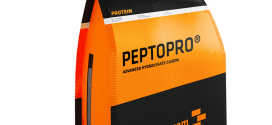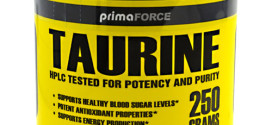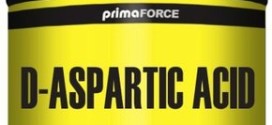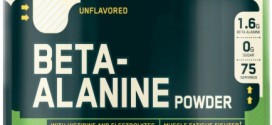Supplement Ingredient Guide: β-Hydroxy β-methylbutyric acid
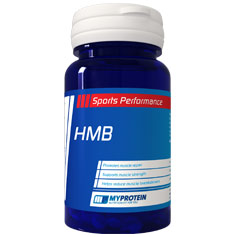
What is it?
Beta-Hydroxy beta-methylbutyric acid (also known as HMB) is a metabolite of the essential amino acid leucine and is synthesised within human body. It plays a part in protein synthesis pathways within the human body.
Indications
It is primarily used for assisting muscle repair, promoting the development of lean muscle mass, and counteract muscle breakdown (catabolism)
How much should I take?
You may take anything between 1.5g – 5g of HMB a day however, the best results seem to be around 3-5g of HMB daily. It’s advised to split the dose throughout the day and for it to be taken along side a meal to facilitate its uptake within the body.
Research
Evidence surrounding HMB is pretty outstanding. HMB’s mode of action isn’t to directly stimulate muscle growth, however, what HMB does is stop muscle breakdown by inhibiting the enzymes which breakdown muscle fibres. Consequently, this leads to overall net increase in muscle tissue.
However, there is also new research just coming out now suggesting that HMB may also work on the muscle tissue in a similar way to whey, telling the body to build more muscle via increase in protein synthesis.
So does HMB build muscle? Well the straight forward answer is YES. A lot of research has gone into it and the results are very impressive. Over the space of three weeks, there was a noticeable increase in muscle size with a gain of 1.2kg on average per person being achieved. And that type of gain has continued with continued supplementation. That was achieved by taking 2-3g daily of HMB. This increase was 3 times more compared to the placebo groups used in these research papers.
So with the increased muscle mass, are you now stronger? Able to lift more? Well again, the straight answer is YES! When researched, it was found that HMB increases strength by up to two times compared to those on a placebo within the space of 3 weeks. These findings have been consistent within all the papers published on HMB. It was shown that regardless of who gets HMB, it will help them lift more.
We already established that HMB will make you bigger and stronger.. so would is give your endurance levels a boost? This one is a little bit more complex, there is conflicting results into that area. In a research paper studying the effects of HMB on endurance cyclists, it was found that it took a longer time to reach VO2 Max which is the stage at which lactic acid is produced and converted in lactate which usually leads to muscle fatigue. HMB seems to have delayed the time taken to reach that stage. However, the trials weren’t conducted for long enough, thus making drawing conclusions something which is hard to do.
Does HMB burn fat? It was only shown in a single study involving 70 year old men. It was also hinted at it’s ability to change some fat to muscle, altering the body:fat ratio. However, there isn’t enough evidence to warrant HMB as a fat burner.
What effect does HMB have on cholesterol? Well, a 2001 study found that HMB was able to reduce “bad” cholesterol (LDL) by a whopping 28% within the body which is a significant drop, however, there hasn’t been any follow up papers to back these findings out.
Finally,we established that HMB is able to build muscle and improve strength drastically in a short amount of time. But it was also found that HMB is able to reduce muscle damage to athletes by around 28% compared to a placebo group. This difference remained for several days after the exercise period with the HMB sample being 9% less even after 4 days. It is by this same mechanism that HMB prevents muscle catabolism (breakdown).
Side effects
All the conducted studies were performed on a short-term basis and found no side effects from HMB supplementation. What would be interesting is a study that explores the potential effects from long term supplementation.
Refernces
1. Alon, T., Bagchi, D. and Preuss, H. G. (2002) Supplementing with beta-hydroxy-beta-methylbutyrate (HMB) to build and maintain muscle mass: a review. Res Commun Mol Pathol Pharmacol. 111 (1-4), 139-151.
2. Flakoll, P., Sharp, R., Baier, S., Levenhagen, D., Carr, C. and Nissen, S. (2004) Effect of beta-hydroxy-beta-methylbutyrate, arginine, and lysine supplementation on strength, functionality, body composition, and protein metabolism in elderly women. Nutrition. 20 (5), 445-451.
3. Gatnau, R., Zimmerman, D. R., Nissen, S. L., Wannemuehler, M. and Ewan, R. C. (1995) Effects of excess dietary leucine catabolites on growth and immune responses in pigs. Journal of Animal Sciences. 73, 159-165.
4. Knitter, A. E., Panton, L., Rathmacher, J. A., Petersen, A. and Sharp, R. (2000) Effects of b-hydroxy-b-methylbutyrate on muscle damage after a prolonged run. Journal of Applied Physiology. 89, 1340-1344.
5. Kreider, R. B., Ferreira, M., Wilson, M. and Almada, A. L. (1999) Effects of calcium beta-hydroxy-beta-methylbutyrate (HMB) supplementation during resistance-training on markers of catabolism, body composition and strength. Int J Sports Med. 20 (8), 503-509.
6. Nissen, S. et al., (1996a). Effect of HMB supplementation on strength and body composition of trained and untrained males undergoing intense resistance training. FASEB J, 10 (3), A287.
7. Nissen, S., sharp, R., Ray, M., Rathmacher, J. A., Rice, D., Fuller, J. C. Connelly, A. S. and Abdumrad, N. (1996b) Effect of leucine metabolite beta-hydroxy-beta-methylbutyrate on muscle metabolism during resistance-exercise training. Journal of Applied Physiology. 81, 2095-2104.
8. Slater, G., Jenkins, D., Logan, P., Lee, H., Vukovich, M., Rathmacher, J. A. and Hahn, A. G. (2001) Beta-hydroxy-beta-methylbutyrate (HMB) supplementation does not affect changes in strength or body composition during resistance training in trained men. Int J Sport nutr Exerc Metab. 11 (3), 384-396.
9. Vukovich, M. D. and Adams, G. D. (1997) Effect of HMB on VO2peak and maximal lactate in endurance-trained cyclists. Medicine and Science in Sports and Exercise. 29, 5, S252, 1432.
10. Vukovich, M. D., stubbs, N. B. and Bolhein, R. N. (2001) Body composition in 70-year-old adults responds to dietary beta-hydroxy-beta-methylbutyrate similar to that of young adults. J Nutr. 131 (7), 2049-2052.
11. Coelho C.W, Carvalho T. Effects of HMB supplementation on LDL-cholesterol, strength, and body composition of patients with hypercholesterolemia, Med. & Sci. in Sports & Exer. 2001; 33:s340
12. Thomson JS, Watson PE, Rowlands DS, Effects of nine weeks of beta-hydroxybeta-methylbutyrate supplementation on strength and body composition in resistance trained men, J. Strength Cond. Res. 2009; 23: 827-835
13. Lamboley CR, Royer D, Dionne IJ. Effects of beta-hydroxy-beta-methylbutyrate on aerobic-performance components and body composition in college students. Int J Sport Nutr Exerc Metab 2007; 17 (1): 56-69.
 Supplement Judge Unbiased Supplement Reviews – Do they really work??
Supplement Judge Unbiased Supplement Reviews – Do they really work??

